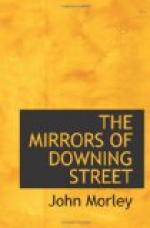Anyone who questioned the cost of the war was a timid soul. What did it matter what the war cost so long as victory was won? Anyone who questioned the utter recklessness which characterized the Ministry of Munitions was a mere fault-finder. I spoke to him once of the unrest in factories, where boys could earn L15 and L16 a week by merely watching a machine they knew nothing about, while the skilled foremen, who alone could put those machines right, and who actually invented new tools to make the new machines of the inventors, were earning only the fixed wage of fifty shillings a week. I thought this arrangement made for unrest and must prove dangerous after the war. So eager, so hot was his mind on the end, that he missed the whole point of my remark. “What does it matter,” he exclaimed impatiently, “what we pay those boys as long as we win the war?”
And the end of it was the humiliation of the General Election in 1918. Where was the new world, then? He was conscious only of Lord Northcliffe’s menace. Germany must pay and the Kaiser must be tried! There was no trumpet note in those days, and there has been no trumpet note since. Imagine how Gladstone would have appealed to the conscience of his countrymen! Was there ever a greater opportunity in statesmanship? After a victory so tremendous, was there any demand on the generosity of men’s souls which would not gladly have been granted? The long struggle between capital and labour, which tears every state in two, might have been ended: the heroism and self-sacrifice of the war might have been carried forward to the labours of reconstruction: the wounds of Europe might have been healed by the charities of God almost to the transfiguration of humanity.
Germany must pay for the war!—and he knew that by no possible means could Germany be made to pay that vast account without the gravest danger of unemployment here and Bolshevism in Central Europe! The Kaiser must be tried!—and he knew that the Kaiser never would be tried!
Millennium dipped below the horizon, and the child’s riding-whip which Lord Northcliffe cracks when he is overtaken by a fit of Napoleonic indigestion assumed for the Prime Minister the proportions of the Damoclesian sword. He numbered himself among the Tououpinambos, those people who “have no name for God and believe that they will get into Paradise by practising revenge and eating up their enemies.”
I can see nothing sinister in what some people regard as his plots against those who disagree with him. He tries, first of all, to win them to his way of thinking: if he fails, and if they still persist in attacking him, he proceeds to destroy them. It is all part of life’s battle! But one would rather that the Prime Minister of Great Britain was less mixed up in journalism, less afraid of journalism, and less occupied, however indirectly, in effecting, or striving to effect, editorial changes. His conduct in the last months of the war and during the election of 1918 was not only unworthy of his position but marked him definitely as a small man. He won the election, but he lost the world.




